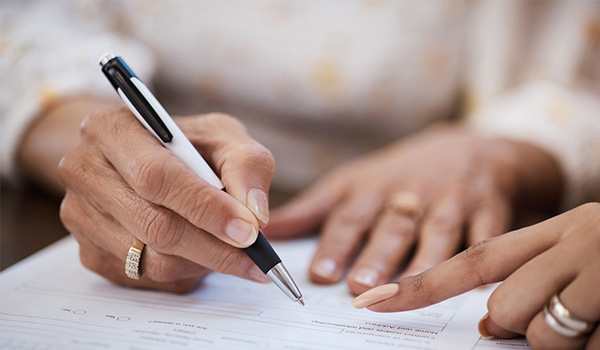09-14-2022 |
What Happens If You Die Without a Will?
By: Robert D. Hodges & Katheryn J. Thorson

You may have heard that if you die without a will, your property will go to the state. For most cases, this is not accurate. Iowa has an intestacy statute which dictates where your assets will go if you die without a will. Here is a chart to explain where your property would go depending on the family members you leave behind:
If you die with: |
Your property will go to: |
|
A spouse but no children |
Your spouse |
|
Children but no spouse |
Your children |
|
A spouse and children who are the biological children of you and your spouse |
Your spouse |
|
A spouse and a child who is your biological child but not the biological child of your spouse |
Your spouse inherits ½ of your real estate and at least ½ of your other property, provided the spouse’s share is worth at least $50,000. Your nonmarital child inherits the other ½. |
|
Parents and siblings but no spouse or children |
Your parents |
|
Parents but no siblings, spouse, or children |
Your parents |
|
Siblings but no spouse, children, or parents |
Your siblings |
If there is no one alive in the categories listed above, then the statute progresses to your aunts, uncles, nieces, nephews, grandparents, cousins, and down on the line. If there is no one in these groups, only then does your property revert to the state of Iowa.
These rules probably follow your general intentions, so why create a will?
First, these intestacy rules do not take into account the nature of your relationships or the relative means of the person inheriting. If you have a long-term partner but are unmarried, all your property could go to your parents and your partner will get nothing. If you are estranged from an aunt, that person could still inherit according to the statute. You may want to give property to a sibling who is not as well off financially instead of your parents, but if either of your parents are living, all your property will go to them if you do not have a spouse or children. You also cannot leave anything to a friend, charity, or other individuals. What if you want to leave a specific asset, such as an engagement ring, to a certain person? Telling that person your wishes is not enough—you have to have a will.
Having control over where your property goes when you die is not the only advantage of creating a will. A will allows you to name your executor (the person who is in charge of gathering your property and distributing it according to the terms of your will), name a guardian for your minor children (see my article on Who You Should Name as Guardian for Your Minor Children), create a trust for minor children, avoid a bond, and possibly reduce the chance of family conflict and litigation after you pass.
Estate planning is more than just creating a will too. You should be thinking about executing powers of attorney in case you are incapacitated and unable to make medical decisions for yourself or handle your financial or business affairs. (Check out my article on Powers of Attorney: What They Are and Why You Need Them).
There are many advantages to having a will in place. Even though it is called a “Last Will and Testament,” you are free to revoke or change your will during your lifetime (by following the proper procedures) so there is very little downside to executing a will as soon as possible.
For more information about estate planning or executing a will, contact one of our estate planning attorneys at BrownWinick.
The material contained in this communication is informational, general in nature and does not constitute legal advice. The material contained in this communication should not be relied upon or used without consulting a lawyer to consider your specific circumstances. This communication was published on the date specified and may not include any changes in the topics, laws, rules or regulations covered. Receipt of this communication does not establish an attorney-client relationship.

